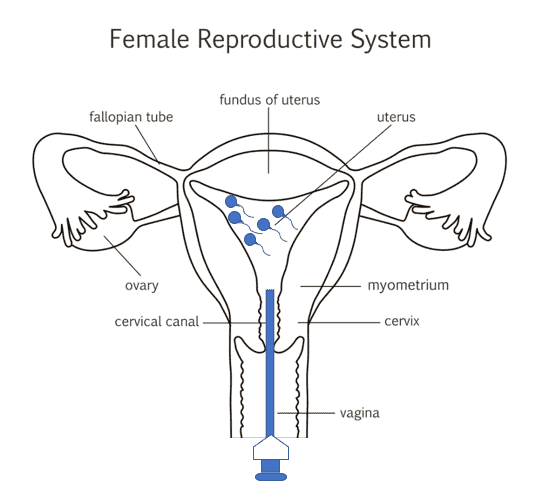
Is an IUI Really Better Than Intercourse?
With two healthy and fertile partners, approximately 200 million sperm are ejaculated into the vagina. But, as this journey continues, that number plummets into the thousands. Of those original 200 million, only around 1 million make it all the way through the cervix into the uterus. From that 1 million, only 10k survive to the top of the uterus. The remainder are absorbed by white blood cells or die off. From the 10,000 sperm cells that make it to the top, only about 1,000 enter the fallopian tube carrying the egg. With this, there is only about a 20% chance of conception each month even with the best of circumstances.
IUI is typically the first step after being unable to get pregnant via intercourse. With an IUI, millions of sperm are automatically placed at the top of the uterus. This optimizes the “meeting” of the sperm and egg. This means that there is a higher chance of conception and live birth.

The IUI Process
The exact process of an IUI treatment cycle is largely determined by two decisions: which (if any) drugs are used and whether or not office monitoring is done. Oral pills, like clomid and letrozole, are easy to get at the pharmacy, but the trigger shot may require a specialty pharmacy. All IUI processes follow the same general biological and procedural stages.


Day 1 of CycleCall Generation Next Fertility on the first day of your period.
Day 2-12(ish)
The first phase of an IUI is the development of your eggs, follicles, and uterine lining. This can be done with or without medications but is most often done with medications to help egg development and the increase of conception.
Medications often begin on days 2-4 of your cycle after your consultation.
Blood and ultrasound monitoring will accompany this part of the cycle to help us determine the follicular and lining growth, ensuring an effective treatment.
Day 13(ish)
An IUI is performed as close to your ovulation day as possible. This is best done with ultrasound and blood tests to measure luteinizing hormone followed by a trigger shot.
If anovulatory, it would be necessary to take a trigger shot. Alternatively, the timing of your ovulation can be measured (though not as accurately) with an ovulation predictor kit.
Your IUI procedure will be scheduled 12-36 hours after your trigger injection or with your ovulation predictor kit.
Day 14(ish)Sperm preparation and the Insemination
During the procedure, the catheter (loaded with concentrated sperm) will be slid past the cervix and into the uterus.
The sperm is then injected into the uterine cavity and the catheter is removed. This procedure only takes a few minutes and doesn’t require any type of anesthesia.
While the procedure is generally well-tolerated, it’s important to note that some individuals may experience mild cramping, which is a normal response to the process.
Are There Risks With An IUI?
Like most other procedures, IUIs do come with some risks.
Fortunately, with the proper care from our incredible staff, these risks can be reduced.
Ovarian Hyperstimulation Syndrome
Ovarian hyperstimulation syndrome (OVHSS) is a response to excess hormones-based medications. It will usually occur in women taking injectable hormone medications to stimulate the development of eggs in the ovaries but it could happen with oral medications as well. This syndrome can cause ovarian swelling, nausea, and can lead to more serious risks. That said, OVHSS, especially a serious case of ovarian hyperstimulation is incredibly rare with IUI. At Generation Next Fertility, we do everything in our power to help mitigate the risk.
Multiple Gestation
When undertaking a medicated IUI cycle, it’s important to be aware that there is a chance the body may develop and ovulate multiple mature eggs. This potential for multiple mature eggs increases the risk of twin or even higher order pregnancies, a phenomenon known as multiple gestation. We often find that appropriately dosed oral medications are especially effective for younger women, those with high AMHs, and those with PCOS, helping to significantly reduce the likelihood of both a multiple gestation and the need to cancel or convert the cycle.
Schedule a Consultation
Choosing the right fertility doctor is the best way to make sure that your dreams come true. Every patient who comes to Generation Next Fertility is treated as an individual and will receive a customized treatment plan to provide them with the best possible results. Our Physicians believe in clear communication and are committed to keeping you fully informed and empowered on your journey. With a combined experience of 50+ years, the doctors at Generation Next Fertility offer world class expertise and a dynamic skill-set that guarantees your satisfaction on every step of your path to parenthood.





